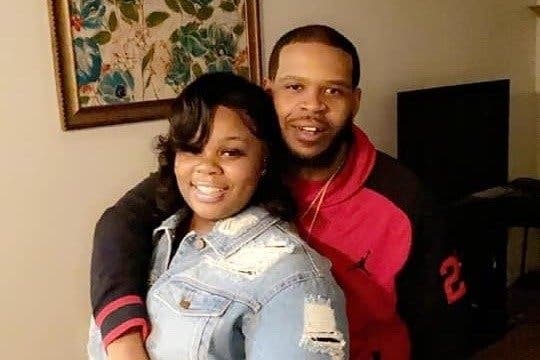In the heated debate over Breonna Taylor’s death, David James is situated perfectly.
The argument has multiple sides – police, politicians, Blacks and officials. He happens to fit all of those – a Black councilman in Louisville and a former narcotics officer who spent 14 years as a cop.
And now he’s key to “The New York Times Presents,” at 10 p.m. Friday (Sept. 4) on FX and Hulu.
This is an extensive look – an hour without commercials, 81 minutes on FX. It has a brief portrayal of Taylor, 26, described by friends, her mother and her boyfriend (Kenneth Walker, shown here with Taylor) as an upbeat soul, an emergency medical technician at work, a fun person at home. Then it gets into the case.
Louisville police planned a March 13 narcotics raid on Taylor’s ex-boyfriend, Jamarcus Glover, hitting four houses in a drug-scarred area. But they also planned to hit Taylor’s apartment in a more-upscale neighborhood, because they felt Glover had been stashing drugs there.
It was a big operation, James says, with 70 officers in combinations that hadn’t worked together before. And all five were “no-knock” warrants, allowing them to simply break down the door.
There are two good choices, James says – no-knock or knock and firmly announce that you’re police. “There is not such a thing as ‘knock and not-announce.’ That is the most dangerous thing you can do,”
especially with Kentucky’s “stand your ground” law.
Police say they announced themselves several times. Neighbors say they heard the knocks, but most say they heard no announcement; one neighbor says he heard one.
And Walker insists he hear none. When the door was being broken, he fired a shot, hitting policeman Jonathan Mattingly in the leg.
Three police – Mattingly, Brett Hankinson and Myles Cosgrove – responded. “I heard about 20-25 shots,” one neighbor says. Adds another: “It sounded like the OK Corral.”
Five of the shots hit Taylor, the film says, and she soon died. “It was a war zone in there,” says an attorney for her family. No drugs were found in the apartment.
In the aftermath, a string of complaints surfaced about Hankinson. He was fired, partly for “wantonly and blindly” shooting from outside the apartment and partly for other complaints.
The complication: Hankinson fired from a position that made it less likely that his were the bullets that hit Taylor.
Now comes the long aftermath. Charges against Walker (for shooting Mattingly) were dropped. Louisville banned no-knock warrants and required body cameras for all drug raids. The FBI and Kentucky’s attorney general are digging through ballistics reports, trying to determine whose bullets went where. Almost a half-year afterward, the fatal raid is a heated subject in Louisville and nationally.
